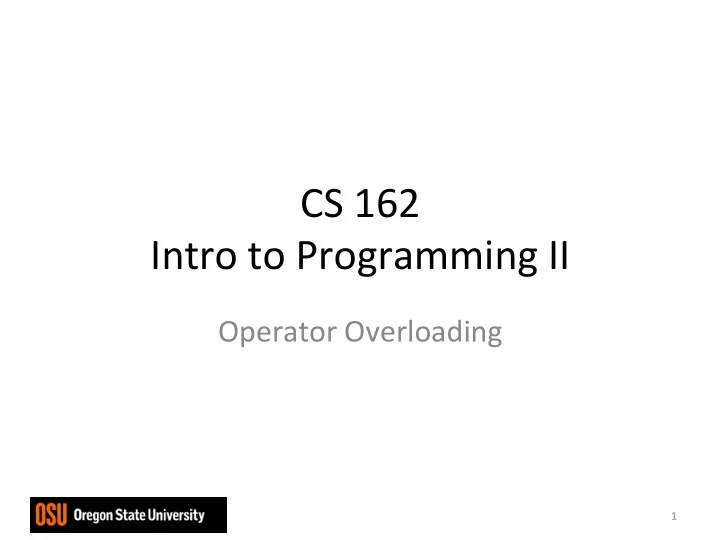

CS ¡162 ¡ Intro ¡to ¡Programming ¡II ¡ Operator ¡Overloading ¡ 1 ¡
11.6 Operator Overloading • Operators such as = , + , and others can be redefined for use with objects of a class • The name of the function for the overloaded operator is operator followed by the operator symbol, e.g. , operator+ is the overloaded + operator and operator= is the overloaded = operator 11-2
Operator Overloading • Operators can be overloaded as - instance member functions, or as - friend functions • The overloaded operator must have the same number of parameters as the standard version. For example, operator= must have two parameters, since the standard = operator takes two parameters. 11-3
Overloading Operators as Instance Members A binary operator that is overloaded as an instance member needs only one parameter, which represents the operand on the right: class OpClass { private: int x; public: OpClass operator+(OpClass right); }; 11-4
Overloading Operators as Instance Members • The left operand of the overloaded binary operator is the calling object • The implicit left parameter is accessed through the this pointer OpClass OpClass::operator+(OpClass r) { OpClass sum; sum.x = this->x + r.x; return sum; } 11-5
Invoking an Overloaded Operator • Operator can be invoked as a member function: OpClass a, b, s; s = a.operator+(b); • It can also be invoked in the more conventional manner: OpClass a, b, s; s = a + b; 11-6
Overloading Assignment • Overloading the assignment operator solves problems with object assignment when an object contains pointer to dynamic memory. • Assignment operator is most naturally overloaded as an instance member function • It needs to return a value of the assigned object to allow cascaded assignments such as a = b = c; 11-7
Overloading Assignment Assignment overloaded as a member function: class CpClass { int *p; public: CpClass(int v=0) { p = new int; *p = v; ~CpClass(){delete p;} CpClass operator=(CpClass); }; 11-8
Overloading Assignment Implementation returns a value: CpClass CpClass::operator=(CpClass r) { *p = *r.p; return *this; }; Invoking the assignment operator: CpClass a, x(45); a.operator=(x); // either of these a = x; // lines can be used 11-9
Notes on Overloaded Operators • Overloading can change the entire meaning of an operator • Most operators can be overloaded • Cannot change the number of operands of the operator • Cannot overload the following operators: ?: . .* sizeof 11-10
Overloading Types of Operators • ++ , -- operators overloaded differently for prefix vs. postfix notation • Overloaded relational operators should return a bool value • Overloaded stream operators >> , << must return istream , ostream objects and take istream , ostream objects as parameters 11-11
Overloaded [] Operator • Can be used to create classes that behave like arrays, providing bounds- checking on subscripts • Overloaded [] returns a reference to object, not an object itself 11-12
Recommend
More recommend